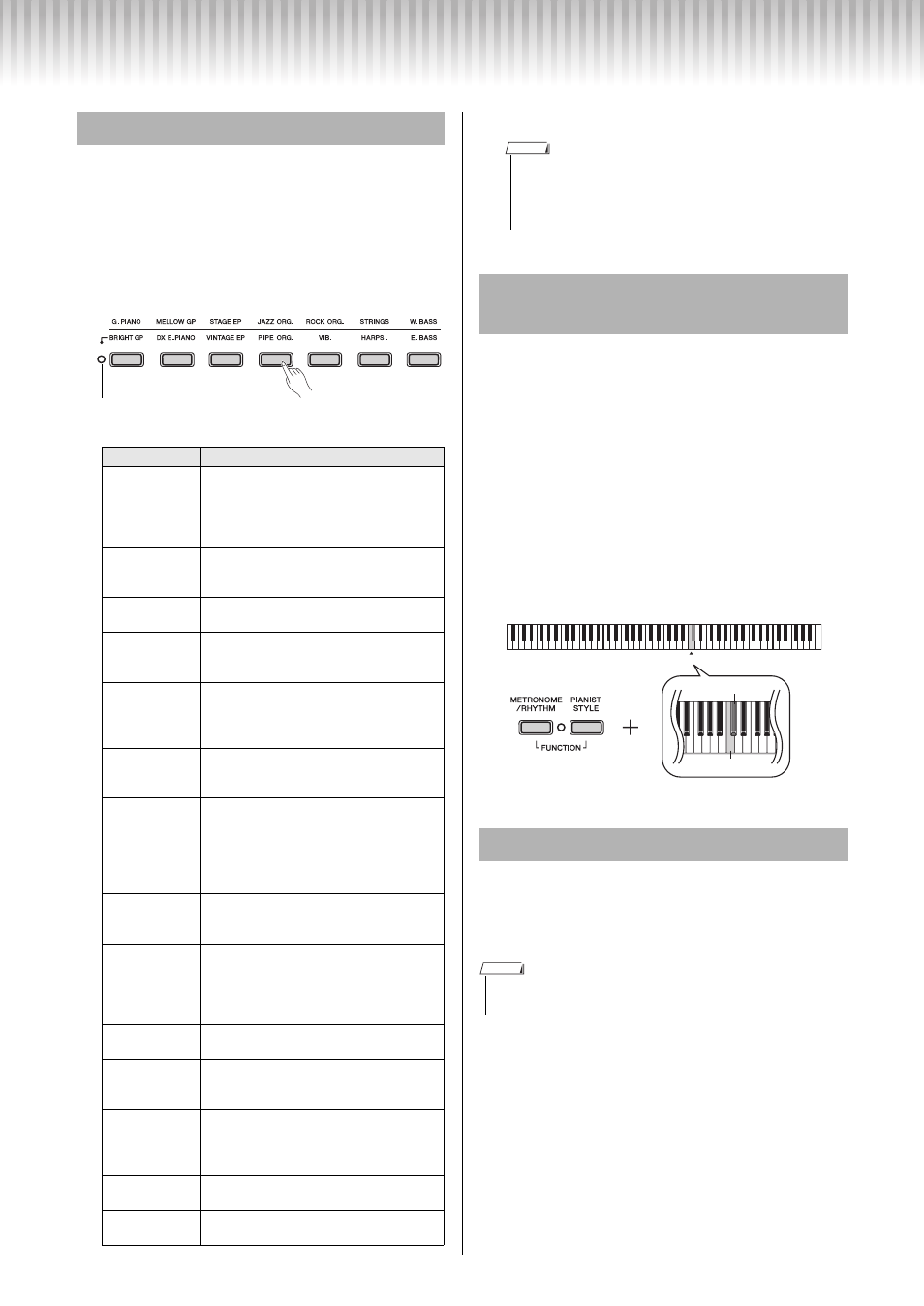Reference, Selecting & playing voices, Selecting a voice – Yamaha P-115 User Manual
Page 13: Strengthening the overall sound (sound boost), Layering two voices (dual), Press a voice button once or twice, Play the keyboard, Engage dual

P-115 Owner’s Manual
13
Reference
Selecting & Playing Voices
The instrument has a wide variety of Voices, or instrument
sounds, for your enjoyment, including Piano and Organ.
1
Press a Voice button once or twice.
Pressing the same Voice button alternates the on/off
status of the lamp, changing between the Voices
whose names are printed above and below the line.
Voice List
2
Play the keyboard.
By using the instrument’s Sound Boost function when
playing along with other instruments, you can raise
the volume and enhance the presence of your perfor-
mance without sacrificing any expressiveness. This
function is particularly useful when you want not only
notes played very loud, but also those played softly, to
be clearly audible.
While holding down [METRONOME/RHYTHM]
and [PIANIST STYLE] simultaneously, press the C4
key to turn on, or press the C
#4 key to turn off.
Default setting:
off
* Refer to the printing above the keyboard (SOUND
BOOST ON or OFF).
You can play Voices simultaneously across the entire
range of the keyboard. Note that the Voice of the left
side button is designated as Voice 1, while the Voice
of the right side button is designated as Voice 2.
1
Engage Dual.
Press the desired Voice button once or twice
(depending on the desired Voice), then while hold-
ing down that button, press the other Voice button
once or twice. When the lamp is off, the Voice
printed above the line is selected; when the lamp is
on, the Voice printed below is selected. When the
buttons are released, Dual is engaged. The lamp
indicates the status of the Voice 1 selection.
Selecting a Voice
Voice Name
Description
GRAND PIANO
Sampled from a concert grand piano. It uses
different samples depending on the playing
strength and produces smoother tonal
changes. Suitable not only for classical com-
positions but also for any style music.
BRIGHT GRAND
Bright piano sound. Clear tone helps the
sound to “cut through” when playing in an
ensemble.
MELLOW
GRAND
Warm and soft piano sound. Good for play-
ing ballads.
DX E.PIANO
An electronic piano sound created by FM
synthesis. Good for standard popular
music.
STAGE
E.PIANO
Vintage electric piano sound of hammer-
struck metallic “tines.” Soft tone when
played lightly, and an aggressive tone
when played hard.
VINTAGE
E.PIANO
Another vintage electric piano sound dif-
ferent from STAGE E.PIANO often heard
in rock and popular music.
JAZZ ORGAN
A “tonewheel” type electric organ. Often
heard in jazz and rock music. When the
separately sold Pedal Unit (LP-5A/LP-
5AWH) is connected, the rotary speed of
the “ROTARY SP” effect can be switched
by using the left pedal.
PIPE ORGAN
A typical pipe organ sound (8 feet + 4 feet
+ 2 feet). Good for sacred music from the
Baroque period.
ROCK ORGAN
Bright and edgy electric organ sound. Good
for rock music. When the separately sold
Pedal Unit (LP-5A/LP-5AWH) is connected,
the rotary speed of the “ROTARY SP” effect
can be switched by using the left pedal.
VIBRAPHONE
Played with relatively soft mallets. The tone
becomes more metallic the harder you play.
STRINGS
Stereo-sampled, large-scale strings
ensemble with realistic reverb. Try combin-
ing this Voice with piano in the Dual mode.
HARPSI-
CHORD
The definitive instrument for baroque
music. Authentic harpsichord sound, with
plucked strings, no touch response, and
characteristic key-release sound.
WOOD BASS
An upright bass played fingerstyle. Ideal
for jazz and Latin music.
E. BASS
For a wide range of music styles, jazz,
rock, popular, and more.
Lamp
When the Voice printed above is selected: lamp is off
When the Voice printed below is selected: lamp is on
• To familiarize yourself with the characteristics of the voices, listen to the
demo songs for each voice (page 17).
• You can shift the Octave as described in the next section (see “To Shift
the Octave for each Voice” on page 14).
Strengthening the Overall Sound
(Sound Boost)
Layering Two Voices (Dual)
• Two Voices of the same button cannot be layered (for example, STRINGS and
HARPSICHORD).
NOTE
C4
C
#4 (off)
C4 (on)
NOTE
